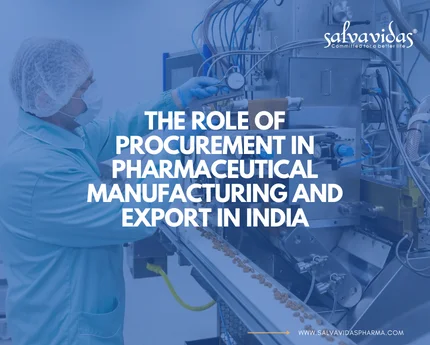
Introduction The pharmaceutical industry in India is a major contributor to the country’s economy, with the sector’s exports reaching almost $20 billion in 2020. The sector plays a crucial role in improving public health by providing essential medicines at affordable prices, not just within the country but also to other countries across the world. The pharmaceutical manufacturing and export industry in India is heavily reliant on logistics to ensure that medicines are produced, packaged, and transported safely and efficiently. This article will delve into the role of logistics in pharmaceutical manufacturing and export in India. Importance of Logistics in Pharmaceutical Manufacturing: Logistics plays a vital role in pharmaceutical manufacturing as it encompasses the entire supply chain process, from procuring raw materials to delivering the finished products to customers. Logistics also includes managing inventory, transportation, warehousing, and distribution. Efficient logistics can ensure the timely delivery of raw materials, quality control during the manufacturing process, and proper storage and transportation of finished products. Supply Chain Management in Pharmaceutical Manufacturing: Effective supply chain management is essential in pharmaceutical manufacturing. The process starts with the procurement of raw materials and packaging materials. Once the raw materials have been received, they are subjected to quality control tests to ensure they meet the required standards. The raw materials are then processed into finished products, which are packaged and stored in a warehouse. Once an order is received, the finished products are packed, labeled, and dispatched to the customer. Effective supply chain management ensures that the products are delivered to the customer on time and in good condition. Pharmaceutical Export Logistics in India: Pharmaceutical exports are an important part of the Indian economy, with the sector accounting for almost 10% of the country’s total exports. The logistics involved in pharmaceutical exports include air and sea freight, warehousing, customs clearance, and transportation to the final destination. Proper documentation and compliance with international regulations are also essential for the export of pharmaceuticals. A well-managed logistics system can help pharmaceutical exporters ensure the timely delivery of products and avoid delays and penalties. Challenges in Logistics in Pharmaceutical Manufacturing and Export: Logistics in pharmaceutical manufacturing and export can be challenging due to several factors. Some of these include: Stringent regulatory requirements Complex transportation routes Lack of proper infrastructure Difficulty in maintaining the cold chain Customs clearance delays Solutions to Logistics Challenges: To overcome these challenges, pharmaceutical manufacturers and exporters can take various steps such as: Investing in proper infrastructure Using technology to track and manage inventory Ensuring compliance with regulations Using temperature-controlled vehicles and warehouses to maintain the cold chain Partnering with logistics service providers who have experience in handling pharmaceutical products Frequently Asked Questions (FAQs): Q. What is the role of logistics in pharmaceutical manufacturing and export?A. Logistics plays a vital role in ensuring the timely and efficient delivery of raw materials, finished products, and pharmaceutical exports. Q. What are the challenges in logistics in pharmaceutical manufacturing and export?A. Some challenges include stringent regulatory requirements, complex transportation routes, lack of proper infrastructure, difficulty in maintaining the cold chain, and customs clearance delays. Q. How can these challenges be overcome?A. Steps such as investing in proper infrastructure, using technology to track and manage inventory, ensuring compliance with regulations, using temperature-controlled vehicles and warehouses to maintain the cold chain, and partnering with experienced logistics service providers can help overcome these challenges. Q. How important is supply chain management in pharmaceutical manufacturing?A. Effective supply chain management is crucial in ensuring that raw materials are received on time, quality control tests are conducted, and finished products are delivered to customers in good condition and on time. Conclusion: The pharmaceutical manufacturing and export industry in India is heavily reliant on logistics. Effective logistics can help ensure that raw materials are procured on time, quality control is maintained during the manufacturing process, and finished products are delivered to customers in a timely and efficient manner. Logistics also plays a crucial role in the export of pharmaceuticals, which is an important sector in the Indian economy. To overcome the challenges faced in logistics, pharmaceutical manufacturers and exporters can take various steps, including investing in proper infrastructure, using technology to track inventory, and partnering with experienced logistics service providers. With a well-managed logistics system, businesses can thrive and succeed in the pharmaceutical manufacturing and export industry in India.

At our company, we understand the crucial role that quality assurance plays in the pharmaceutical manufacturing and export industry. As a trusted provider of pharmaceutical products, we ensure that all of our products are subject to rigorous quality assurance measures throughout the manufacturing and distribution process. In this article, we will explore the importance of quality assurance in pharmaceutical manufacturing and export and provide insight into how our company ensures the quality of our products. Why Quality Assurance Matters in Pharmaceutical Manufacturing and Export Quality assurance is essential in the pharmaceutical industry to ensure that products are safe, effective, and consistent. Quality assurance measures can help identify and prevent errors and defects in the manufacturing process, which can compromise the safety and effectiveness of the final product. Quality assurance also plays a critical role in protecting the reputation of pharmaceutical companies and ensuring compliance with regulatory requirements. Our Quality Assurance Process At our company, we follow a comprehensive quality assurance process to ensure the safety and effectiveness of our products. Our process includes the following steps: Raw Material Selection – We select only the highest quality raw materials from trusted suppliers. Manufacturing Process – Our manufacturing process is closely monitored and documented to ensure that it meets all quality and regulatory requirements. Testing – Our products undergo rigorous testing at every stage of the manufacturing process to ensure that they meet our high-quality standards. Packaging and Distribution – Our products are packaged and distributed in accordance with industry best practices to ensure their safety and efficacy. We also have a team of experienced quality assurance professionals who oversee the entire manufacturing and distribution process to ensure that our products meet the highest standards of quality and safety. The Benefits of Our Quality Assurance Process Our commitment to quality assurance has numerous benefits for our customers and our business, including: Increased Safety – Our products are subject to rigorous quality control measures that help ensure their safety and effectiveness. Improved Efficacy – Our quality assurance process helps ensure that our products are consistent and effective, providing our customers with the results they need. Regulatory Compliance – Our quality assurance process helps ensure that we meet all regulatory requirements, protecting our business from potential fines and legal action. Customer Trust – Our commitment to quality assurance helps build trust with our customers, enhancing our reputation and helping us to build a loyal customer base. Conclusion At our company, we understand the importance of quality assurance in pharmaceutical manufacturing and export. Our commitment to quality assurance ensures that our products are safe, effective, and consistent, helping us to build trust with our customers and protect our business from potential legal action. If you are in the market for high-quality pharmaceutical products, we encourage you to choose our company for your needs.

Introduction The pharmaceutical industry in India is one of the major contributors to the country’s economy. According to the Indian Brand Equity Foundation, the industry is projected to grow to US$ 100 billion by 2025. A significant portion of this growth is attributed to the industry’s robust procurement system. Procurement plays a vital role in ensuring the timely and cost-effective availability of raw materials, equipment, and services. This article discusses the role of procurement in pharmaceutical manufacturing and export in India, the challenges it faces, and its future prospects. The Role of Procurement in Pharmaceutical Manufacturing and Export in India: Procurement is an integral part of the pharmaceutical industry’s value chain. It is responsible for acquiring the necessary raw materials, packaging materials, and equipment required for drug manufacturing. Procurement also plays a crucial role in ensuring the timely delivery of finished products to customers. The following are some of the key roles played by procurement in the pharmaceutical industry in India. Ensuring the availability of raw materials: Procurement is responsible for ensuring the timely availability of raw materials required for drug manufacturing. This involves identifying the right suppliers, negotiating the best prices, and managing the delivery schedules. Quality control: Procurement plays a crucial role in ensuring the quality of raw materials, packaging materials, and equipment. It involves identifying the right suppliers who can provide the required quality and conducting regular quality audits. Cost optimization: Procurement plays a crucial role in optimizing the cost of drug manufacturing. This involves identifying the right suppliers who can provide the required quality at the best prices. Compliance with regulations: Procurement plays a crucial role in ensuring compliance with the regulations governing drug manufacturing. It involves identifying the right suppliers who can provide the required quality, quantity, and documentation to meet regulatory requirements. Challenges faced by Procurement in Pharmaceutical Manufacturing and Export in India: Procurement faces several challenges in the pharmaceutical industry in India. The following are some of the significant challenges. Price fluctuations: Procurement is heavily dependent on the prices of raw materials. Price fluctuations can significantly impact the cost of drug manufacturing. Quality control: Ensuring the quality of raw materials, packaging materials, and equipment is a significant challenge faced by procurement. The lack of quality control can result in product recalls, which can significantly impact the industry’s reputation. Supply chain disruptions: The COVID-19 pandemic has highlighted the importance of supply chain resilience. Procurement faces the challenge of managing supply chain disruptions due to various reasons like natural calamities, logistic issues, etc. Regulatory compliance: Ensuring compliance with the regulations governing drug manufacturing is a significant challenge faced by procurement. It involves managing the documentation requirements, quality control, and audits. Future prospects of Procurement in Pharmaceutical Manufacturing and Export in India: Procurement is poised to play a more significant role in the pharmaceutical industry’s growth in India. The following are some of the future prospects of procurement. Digitalization: The adoption of digital procurement tools can significantly improve the efficiency and effectiveness of procurement processes. Localization: Localization of the supply chain can reduce the dependence on imports and improve the supply chain’s resilience. Collaboration: Collaboration between the industry, academia, and the government can significantly improve the procurement system’s efficiency and effectiveness. Sustainability: Procurement can play a vital role in ensuring sustainability in the pharmaceutical industry. It involves identifying sustainable suppliers, promoting sustainable practices, and reducing the environmental impact. FAQs: Q. What is the role of procurement in the pharmaceutical industry?Ans: Procurement plays a vital role in the pharmaceutical industry by ensuring the timely and cost-effective availability of raw materials, equipment, and services. It is responsible for acquiring the necessary raw materials, packaging materials, and equipment required for drug manufacturing. Procurement also plays a crucial role in ensuring the timely delivery of finished products to customers. Q. What are the major challenges faced by procurement in the pharmaceutical industry in India?Ans: Procurement faces several challenges in the pharmaceutical industry in India, including price fluctuations, quality control, supply chain disruptions, and regulatory compliance. Q. What are the future prospects of procurement in pharmaceutical manufacturing and export in India?Ans: The future prospects of procurement in the pharmaceutical industry in India include digitalization, localization, collaboration, and sustainability. Conclusion: Procurement plays a crucial role in the pharmaceutical industry’s growth in India. It ensures the timely and cost-effective availability of raw materials, equipment, and services. Procurement faces several challenges, including price fluctuations, quality control, supply chain disruptions, and regulatory compliance. However, the adoption of digital procurement tools, localization of the supply chain, collaboration, and sustainability can significantly improve the procurement system’s efficiency and effectiveness. The future looks bright for procurement in the pharmaceutical industry in India.

0